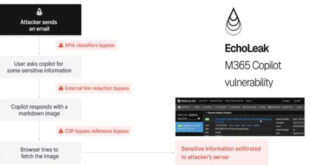Oasis Security discovered a flaw in Microsoft’s Multi-Factor Authentication (MFA) system, allowing attackers to bypass it and access user accounts, including Outlook, OneDrive, Teams, and Azure. With over 400 million Office 365 users, the impact of this vulnerability could be significant.
Research team claim, “The bypass was simple: it took around an hour to execute, required no user interaction and did not generate any notification or provide the account holder with any indication of trouble.”
By infosecbulletin
/ Wednesday , June 18 2025
Russian cybersecurity experts discovered the first local data theft attacks using a modified version of legitimate near field communication (NFC)...
Read More
By infosecbulletin
/ Tuesday , June 17 2025
Cybersecurity researcher Jeremiah Fowler discovered an unsecured database with 170,360 records belonging to a real estate company. It contained personal...
Read More
By infosecbulletin
/ Tuesday , June 17 2025
GreyNoise found attempts to exploit CVE-2023-28771, a vulnerability in Zyxel's IKE affecting UDP port 500. The attack centers around CVE-2023-28771,...
Read More
By infosecbulletin
/ Tuesday , June 17 2025
The U.S. Cybersecurity and Infrastructure Security Agency (CISA) has recently included two high-risk vulnerabilities in its Known Exploited Vulnerabilities (KEV)...
Read More
By infosecbulletin
/ Monday , June 16 2025
SafetyDetectives’ Cybersecurity Team discovered a public post on a clear web forum in which a threat actor claimed to have...
Read More
By infosecbulletin
/ Sunday , June 15 2025
WestJet, Canada's second-largest airline, is looking into a cyberattack that has affected some internal systems during its response to the...
Read More
By infosecbulletin
/ Saturday , June 14 2025
Resecurity found 7.4 million records of Paraguayan citizens' personal information leaked on the dark web today. Last week, cybercriminals attempted...
Read More
By infosecbulletin
/ Friday , June 13 2025
HashiCorp has revealed a critical vulnerability in its Nomad tool that may let attackers gain higher privileges by misusing the...
Read More
By infosecbulletin
/ Friday , June 13 2025
SoftBank has disclosed that personal information of more than 137,000 mobile subscribers—covering names, addresses, and phone numbers—might have been leaked...
Read More
By infosecbulletin
/ Friday , June 13 2025
Serious security vulnerabilities in Trend Micro Apex One could allow attackers to inject malicious code and elevate their privileges within...
Read More
When users access the login page, they receive a session identifier. After entering a valid email and password, they must verify their identity. Microsoft offers various MFA methods, such as using a verification code from an app. Users enter a 6-digit code from the app to complete the authentication. Up to 10 consequent failed attempts were allowed for a single session.
The Oasis research team quickly generated new sessions and codes, demonstrating that they could rapidly exhaust all options for a 6-digit code (1 million combinations). In simple terms, they could make many attempts at once.
Oasis informed Microsoft of the issue, which acknowledged its existence in June and fixed it permanently by Oct. 9, the researchers said. “While specific details of the changes are confidential, we can confirm that Microsoft introduced a much stricter rate limit that kicks in after a number of failed attempts; the strict limit lasts around half a day,” Hason wrote.
Vulnerability timeline and Microsoft response:
24/06/2024 – Microsoft Acknowledgment of the issue
04/07/2024 – Microsoft Deployed a temporary fix
09/10/2024 – Microsoft Deployed Permanent Fix
Click here to read the full story.
Source: oasis.security
 InfoSecBulletin Cybersecurity for mankind
InfoSecBulletin Cybersecurity for mankind














